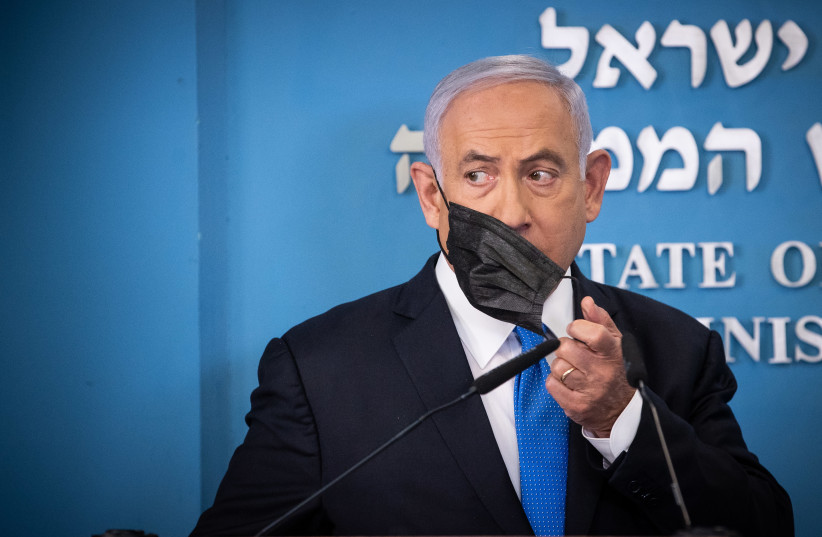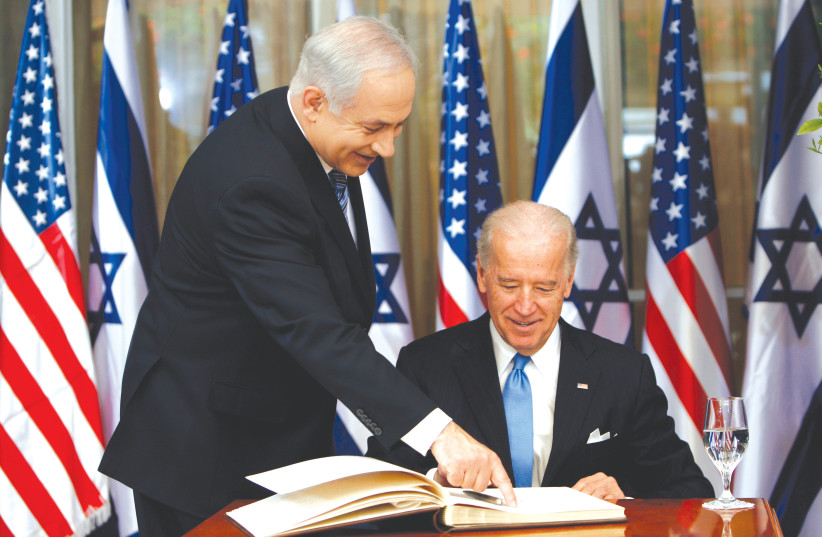Israel’s incoming prime minister’s cult of personality is likely to be more difficult to promote abroad than at home.

Incoming prime minister Benjamin Netanyahu announced he can form a government amid jubilation on the Right, despair on the Left and warnings from the international media that he was the “godfather” of Israeli fascism and that the country’s democracy was now in peril.
It is yet one more step, but not the final step toward the swearing-in of his government.
Netanyahu is among the most globally well-known and powerful politicians in Israel, having already spent 15 years of his life at the country’s helm, making him the longest-serving prime minister even before he enters office.
This will be his third stint as prime minister, having served in that role from 1996 to 1999 and again from 2009 to 2021. The growing cult of personality that has accompanied his prolonged tenure has increasingly dominated the domestic political debate, creating opposing camps out of those who are pro-Netanyahu and those who are against him.
Who Netanyahu is, has become one of the most central questions within Israeli politics and he has also made it one of the most critical questions for Israel’s diplomatic relations.
Why are Israel’s Western allies worried?
Only this week, the popular US-based website Politico published an article explaining that US President Joe Biden’s strategy for dealing with the new Israeli government is to make it about “Bibi,” the nickname often used for Netanyahu.

There are reasons why Israel’s Western allies are worried. The demands made by Netanyahu’s coalition partners could weaken the judiciary, strengthen the power of Orthodox Judaism within Israeli civic life and further expand the de-facto annexation of the West Bank, also known as Judea and Samaria. Concern has been raised specifically about the individual rights of women, the LGBTQ community and Arab-Israelis.
Those stances have led to questions as to whether the nature of the state itself has changed, specifically with respect to democracy, one of the main pillars on which Israel’s ties with its Western allies rest.
In speaking of Israel, Western diplomats often mention the issue of shared values. The line that Israel is the only democracy in the Middle East is one of the Jewish state’s most often-used public relations responses to diplomatic attacks against it, particularly with respect to its treatment of the Palestinians.
The independence of Israel’s judiciary has also been a key element of its arguments against the push for the International Criminal Court to allow Israelis to stand trial for war crimes.
The previous government led by former prime minister Naftali Bennett and outgoing Prime Minister Yair Lapid used Israeli democracy as an issue to strengthen the country’s ties with its allies. They often noted that theirs was a rainbow government made up of parties from the Left, Center and Right of the political map, including an Arab-Israeli party.
Now, there is a sense that Israel stands at a crossroads in this particular aspect of its diplomatic relations.
Will Netanyahu’s reassuring media blitz aid diplomatic efforts?
In the past week, Netanyahu has gone on a media blitz to assure the international community that there is nothing to fear given that ultimately, he will be in charge and his values are their values.
In effect, he was explaining that it was his personality and power, and not the legislature or his government that mattered.
In a series of extensive interviews, he outlined his intended domestic and diplomatic policies, pledging to protect minority rights and to widen Israel’s ties with the Arab world. He pledged that new alliances such as with Saudi Arabia could help resolve the Israeli-Palestinian conflict.

Netanyahu even said he would be willing to sit down immediately and speak with the Palestinians, something that Lapid, who heads a centrist party, was not willing to do. Netanyahu did this even though he heads a coalition that would never support a peace deal.
When Netanyahu left office in 2021 after failing to form a government, he had achieved an unprecedented diplomatic victory by normalizing ties with four Arab countries under the auspices of the Abraham Accords. His close ties with former US president Donald Trump had also led to American recognition of Jerusalem as the capital of Israel and Israeli sovereignty over the Golan Heights.
But he left office with strained relations with the European Union and neighboring Jordan. Those tensions are likely to re-emerge when Netanyahu returns.
Can Netanyahu navigate through Ukraine, Russia and Iran?
The diplomatic waters through which Israel must navigate as it heads into 2023 are infinitely more complex than the ones that existed in 2021 and he will run into trouble on other fronts as well.
When Netanyahu was last in office, Israel benefited from his strong relationship with Russian President Vladimir Putin, particularly with regard to Iran’s attempt to entrench itself in neighboring Syria.
Now, Israel’s ties to Ukraine will complicate that relationship, particularly as the United States takes a stronger stance in support of Kyiv and Russia tightens its military alliance with Iran.
IN MANY of his interviews, Netanyahu listed combating the growing threat of Iran against the Jewish state as one of the central reasons why he wanted to return to power.
His opposition to the 2015 Iran nuclear deal created deep tension between him and the US when former president Barack Obama was in power.
President Joe Biden’s deep desire to revive that deal reignited those tensions over Iran, but it never became the full-blown pitched battle that had existed between Netanyahu and Obama. This has been particularly true in recent months as the Biden administration now appears to have turned away from arguing that the deal can ne an effective tool to counter Iran’s nuclear program.
The Biden administration’s desire to seek other options puts it right in line with Netanyahu’s own assessment about the futility of a deal with Iran, but it also raises the stakes for maintaining tight ties with the US.
Netanyahu and the Biden administration can immediately bond, as Israel already has, with joint strategies in regard to Iran that are not tied to the deal.
This is happening just as the Biden administration is likely to have a more diplomatically combative relationship with a Netanyahu-led Israel over the Palestinians and issues of democracy.
In the absence of an Iran deal, however, the risk of military escalation between Israel and Iran grows, and for that, Netanyahu will need the kind of US support that comes from strong ties with the Biden administration.
The line “trust me on democracy” will not be enough.
He and Biden might be old friends and Biden might “love him” even though he disagrees with him. But Biden will likely use Iran as a bullwhip to help secure concessions from Netanyahu on issues of democracy and the Palestinians.
New Arab allies will likely also seek to weigh in and could refuse to continue to improve their relations with Israel unless it halts what they would consider de-facto annexation in the West Bank, particularly given that Israel’s agreement to suspend West Bank annexation in 2020 was a condition for creating such ties.
The cult of personality is likely to be more difficult to promote abroad than at home.
As a known quantity, Netanyahu will not get a honeymoon period. He might like to be in charge, but from the start, he will find himself in troubled diplomatic waters. He will be a caretaker of perpetual crises and have to walk a tight tightrope between domestic political demands and those of his allies abroad.
The stakes are particularly high for him, because he will have to maintain his record if not exceed it, and it will be these last years that will cement his legacy.
As reported by The Jerusalem Post
